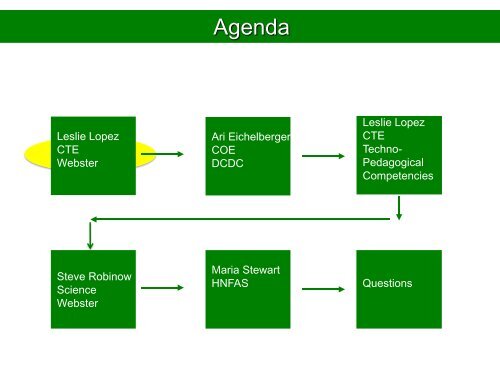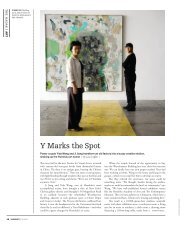TechnoPedagogy PowerPoint - the Center for Teaching Excellence!
TechnoPedagogy PowerPoint - the Center for Teaching Excellence!
TechnoPedagogy PowerPoint - the Center for Teaching Excellence!
Create successful ePaper yourself
Turn your PDF publications into a flip-book with our unique Google optimized e-Paper software.
Agenda<br />
Leslie Lopez<br />
CTE<br />
Webster<br />
Ari Eichelberger<br />
COE<br />
DCDC<br />
Leslie Lopez<br />
CTE<br />
Techno-<br />
Pedagogical<br />
Competencies<br />
Steve Robinow<br />
Science<br />
Webster<br />
ESL/ELL<br />
Maria Stewart<br />
HNFAS<br />
Questions
Questions about Webster 101?<br />
http://www.cte.hawaii.edu/
Agenda<br />
Leslie Lopez<br />
CTE<br />
Webster<br />
Ari Eichelberger<br />
Paul McKimmy<br />
Faye Furutomo<br />
COE<br />
DCDC<br />
Leslie Lopez<br />
CTE<br />
Techno-<br />
Pedagogical<br />
Competencies<br />
Steve Robinow<br />
Science<br />
Webster<br />
ESL/ELL<br />
Maria Stewart<br />
HNFAS<br />
Questions
Best Practices<br />
in New Environments<br />
Ari Eichelberger<br />
Paul McKimmy<br />
Faye Furutomo
DCDC<br />
Instructional Designers<br />
Multimedia Specialists<br />
Educational Technologists<br />
IT Specialists<br />
ETEC M.Ed & PhD.<br />
Students
DCDC<br />
Self-funded unit of <strong>the</strong> UHM College of Ed<br />
Began in 2007 through a US DOE as a grant to<br />
build COE online programs
Services we provide<br />
Online Course and Module Development<br />
Web Development<br />
Professional Development & Support<br />
Web Conferencing Services
Best Practices<br />
in New Environments
New Environments<br />
• Online – no f2f student<br />
instructor interaction<br />
• Hybrid – blended online and<br />
f2f<br />
• Flipped – using technology<br />
(online resources) to “flip” inclass<br />
time from content<br />
delivery to application<br />
•
Online, Hybrid, Flipped<br />
• All require online content<br />
delivery<br />
• Our area, but perhaps not<br />
yours<br />
• So how do I think about<br />
designing in <strong>the</strong>se new<br />
environments?
Useful model<br />
Instructor<br />
Essential interactions in distance<br />
education<br />
Moore (1993)<br />
Student<br />
Content<br />
Classmates
Useful model<br />
Instructor<br />
Essential interactions in distance<br />
education<br />
Moore (1993)<br />
Student<br />
Content<br />
Classmates
Student to Content Best Practices<br />
• Be consistent<br />
• Use multimedia<br />
• Provide opportunities <strong>for</strong> practice
dcdcgroup.org
Questions?
Agenda<br />
Leslie Lopez<br />
CTE<br />
Webster<br />
Ari Eichelberger<br />
Paul McKimmy<br />
Faye Furutomo<br />
COE<br />
DCDC<br />
Leslie Lopez<br />
CTE<br />
Techno-<br />
Pedagogical<br />
Competencies<br />
Steve Robinow<br />
Science<br />
Webster<br />
ESL/ELL<br />
Maria Stewart<br />
HNFAS<br />
Questions
Best Practices in New Environments<br />
Technopedagogical<br />
model,<br />
competencies and<br />
strategies.<br />
April , 2013<br />
Leslie Lopez<br />
<strong>Center</strong> <strong>for</strong> <strong>Teaching</strong> <strong>Excellence</strong><br />
University of Hawai'i Mānoa
What is an innovative space?<br />
Pre-Survey<br />
students’ learning<br />
<strong>the</strong>re is no “front” to <strong>the</strong><br />
classroom.<br />
students are oriented<br />
toward each o<strong>the</strong>r in <strong>the</strong>ir<br />
groups.<br />
new learning spaces are<br />
designed to support<br />
active-learning teaching<br />
strategies, such as<br />
collaborative learning,<br />
peer instruction, and<br />
activities that benefit from<br />
access to networked<br />
computers.
What does teaching with technology look like?<br />
Pre-Survey<br />
Source: http://tpack.org<br />
The Technological Pedagogical Content Knowledge (is a collaboratively developed framework of<br />
scholars and researchers seeking to conceptualize and clarify <strong>the</strong> competencies that evolve from<br />
<strong>the</strong> intersection between pedagogy and technology.
Active Learning<br />
Activity Directions:<br />
This is a timed activity.<br />
1) Break into groups of 7 at each table.<br />
2) Distribute one card per person. You have one minute to read your card on your own<br />
and highlight key in<strong>for</strong>mation.<br />
3) In numerical order, share 1) what your competency is called; and 2) explain what it is.<br />
Highlight where your competency falls on <strong>the</strong> TPACK model.
2<br />
1 3 4<br />
5 6 7
What are <strong>the</strong> <strong>the</strong>oretical implications?<br />
Technological Rationalization integration of technology in <strong>the</strong> workplace<br />
Technological Determinism<br />
Marshall McLuhann<br />
Social Determinism<br />
Langdon Winner
Resources on Campus?<br />
Professional<br />
Development<br />
Tech Thursdays<br />
Mid-Semester Services<br />
Professional Development<br />
Program<br />
Standards
Closure<br />
Possible follow up assessment activity?<br />
1) Blank Graphic Organizer.<br />
2) Matrix table ranking competencies by com<strong>for</strong>t levels with rationale.<br />
Uncom<strong>for</strong>table<br />
Somewhat<br />
Com<strong>for</strong>table<br />
TK TPACK PK CK<br />
Con<strong>for</strong>table<br />
3) Check <strong>for</strong> understanding using iClickers.<br />
Source: Van Horne, S. (2012). Promoting Active Learning in Technology-Infused TILE Classrooms at <strong>the</strong> University of Iowa. Journal of Learning<br />
Spaces, 1(2). Retrieved from http://libjournal.uncg.edu/ojs/index.php/jls/article/view/344
Agenda<br />
Leslie Lopez<br />
CTE<br />
Webster<br />
Ari Eichelberger<br />
Paul McKimmy<br />
Faye Furutomo<br />
COE<br />
DCDC<br />
Leslie Lopez<br />
CTE<br />
Techno-<br />
Pedagogical<br />
Competencies<br />
Steve Robinow<br />
Science<br />
Webster<br />
ESL/ELL<br />
Maria Stewart<br />
HNFAS<br />
Questions
Dr. Steve Robinow<br />
2013 Recipient of <strong>the</strong><br />
Chancellor’s Citation <strong>for</strong> Meritorious <strong>Teaching</strong>
Agenda<br />
Leslie Lopez<br />
CTE<br />
Webster<br />
Ari Eichelberger<br />
Paul McKimmy<br />
Faye Furutomo<br />
COE<br />
DCDC<br />
Leslie Lopez<br />
CTE<br />
Techno-<br />
Pedagogical<br />
Competencies<br />
Steve Robinow<br />
Science<br />
Webster<br />
ESL/ELL<br />
Maria Stewart<br />
HNFAS<br />
Questions
Dr. Maria Stewart<br />
2013 Recipient of <strong>the</strong><br />
Frances Davis Award <strong>for</strong> <strong>Excellence</strong> in Undergraduate <strong>Teaching</strong>
Agenda<br />
Leslie Lopez<br />
CTE<br />
Webster<br />
Ari Eichelberger<br />
Paul McKimmy<br />
Faye Furutomo<br />
COE<br />
DCDC<br />
Leslie Lopez<br />
CTE<br />
Techno-<br />
Pedagogical<br />
Competencies<br />
Steve Robinow<br />
Science<br />
Webster<br />
ESL/ELL<br />
Maria Stewart<br />
HNFAS<br />
Questions
Content Knowledge (CK) –<br />
“Teachers’ knowledge about <strong>the</strong><br />
subject matter to be learned or<br />
taught. The content to be covered<br />
in middle school science or history<br />
is different from <strong>the</strong> content to be<br />
covered in an undergraduate<br />
course on art appreciation or a<br />
graduate seminar on astrophysics…<br />
As Shulman (1986) noted, this<br />
knowledge would include<br />
knowledge of concepts, <strong>the</strong>ories,<br />
ideas, organizational frameworks,<br />
knowledge of evidence and proof,<br />
as well as established practices<br />
and approaches toward<br />
developing such knowledge<br />
(Koehler & Mishra, 2009).<br />
Pedagogical Knowledge (PK) –<br />
“Teachers’ deep knowledge about<br />
<strong>the</strong> processes and practices or<br />
methods of teaching and learning.<br />
They encompass, among o<strong>the</strong>r<br />
things, overall educational<br />
purposes, values, and aims. This<br />
generic <strong>for</strong>m of knowledge applies<br />
to understanding how students<br />
learn, general classroom<br />
management skills, lesson planning,<br />
and student assessment.” (Koehler<br />
& Mishra, 2009).<br />
Technology Knowledge (TK) –<br />
Knowledge about certain ways of<br />
thinking about, and working with<br />
technology, tools and resources.<br />
and working with technology can<br />
apply to all technology tools and<br />
resources. This includes<br />
understanding in<strong>for</strong>mation<br />
technology broadly enough to<br />
apply it productively at work and in<br />
everyday life, being able to<br />
recognize when in<strong>for</strong>mation<br />
technology can assist or impede<br />
<strong>the</strong> achievement of a goal, and<br />
being able continually adapt to<br />
changes in in<strong>for</strong>mation<br />
technology (Koehler & Mishra,<br />
2009).<br />
Pedagogical Content Knowledge<br />
(PCK) –PCK is <strong>the</strong> notion of <strong>the</strong><br />
trans<strong>for</strong>mation of <strong>the</strong> subject<br />
matter <strong>for</strong> teaching. Specifically,<br />
according to Shulman (1986), this<br />
trans<strong>for</strong>mation occurs as <strong>the</strong><br />
teacher interprets <strong>the</strong> subject<br />
matter, finds multiple ways to<br />
represent it, and adapts and tailors<br />
<strong>the</strong> instructional materials to<br />
alternative conceptions and<br />
students’ prior knowledge. PCK<br />
covers <strong>the</strong> core business of<br />
teaching, learning, curriculum,<br />
assessment and reporting, such as<br />
<strong>the</strong> conditions that promote<br />
learning and <strong>the</strong> links among<br />
curriculum, assessment, and<br />
pedagogy” (Koehler & Mishra,<br />
2009).<br />
Technological Content Knowledge<br />
(TCK) – The manner in which<br />
technology and content influence<br />
and constrain one ano<strong>the</strong>r.<br />
Teachers need to master more<br />
than <strong>the</strong> subject matter <strong>the</strong>y<br />
teach; <strong>the</strong>y must also have a deep<br />
understanding of <strong>the</strong> manner in<br />
which <strong>the</strong> subject matter (or <strong>the</strong><br />
kinds of representations that can<br />
be constructed) can be changed by<br />
<strong>the</strong> application of particular<br />
technologies. Teachers need to<br />
understand which specific<br />
technologies are best suited <strong>for</strong><br />
addressing subject-matter learning<br />
in <strong>the</strong>ir domains and how <strong>the</strong><br />
content dictates or perhaps even<br />
changes <strong>the</strong> technology—or vice<br />
versa (Koehler & Mishra, 2009).<br />
Technological Pedagogical<br />
Knowledge (TPK) – An<br />
understanding of how teaching<br />
and learning can change when<br />
particular technologies are used<br />
in particular ways. This includes<br />
knowing <strong>the</strong> pedagogical<br />
af<strong>for</strong>dances and constraints of a<br />
range of technological tools as<br />
<strong>the</strong>y relate to disciplinarily and<br />
developmentally appropriate<br />
pedagogical designs and<br />
strategies” (Koehler & Mishra,<br />
2009).<br />
Technological Pedagogical Content Knowledge (TPACK) – Underlying<br />
meaningful and skilled teaching with technology, TPACK is different<br />
from knowledge of all three concepts individually. Instead, TPACK is<br />
<strong>the</strong> basis of effective teaching with technology, requiring an<br />
understanding of <strong>the</strong> representation of concepts using<br />
technologies; pedagogical techniques that use technologies in<br />
constructive ways to teach content; knowledge of what makes<br />
concepts difficult or easy to learn and how technology can help<br />
redress some of <strong>the</strong> problems that students face; knowledge of<br />
students’ prior knowledge and <strong>the</strong>ories of epistemology; and<br />
knowledge of how technologies can be used to build on existing<br />
knowledge to develop new epistemologies or streng<strong>the</strong>n old ones”<br />
(Koehler & Mishra, 2009).











